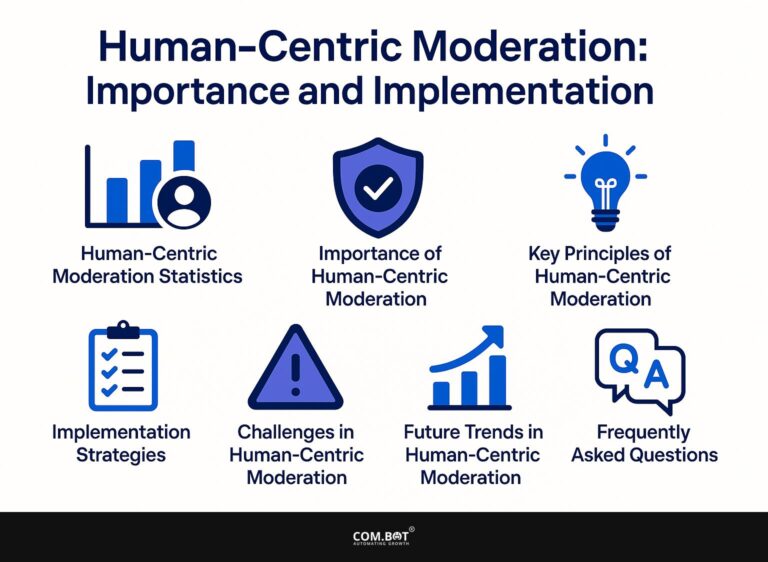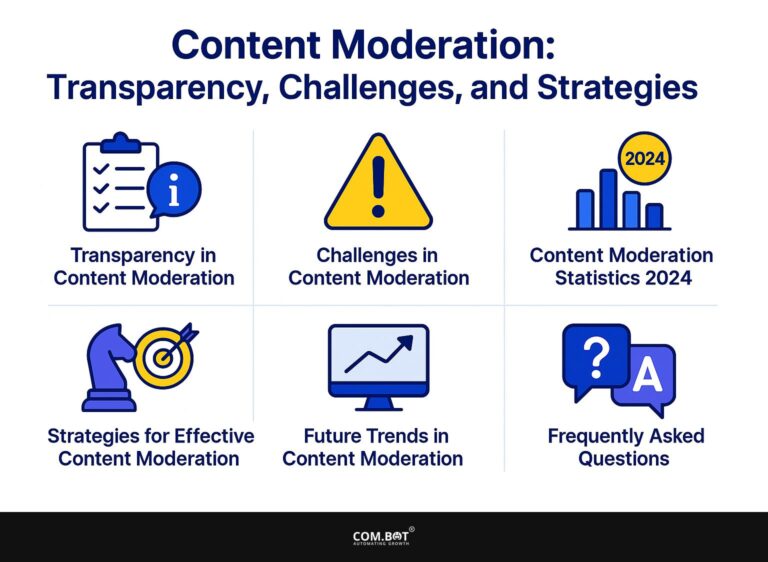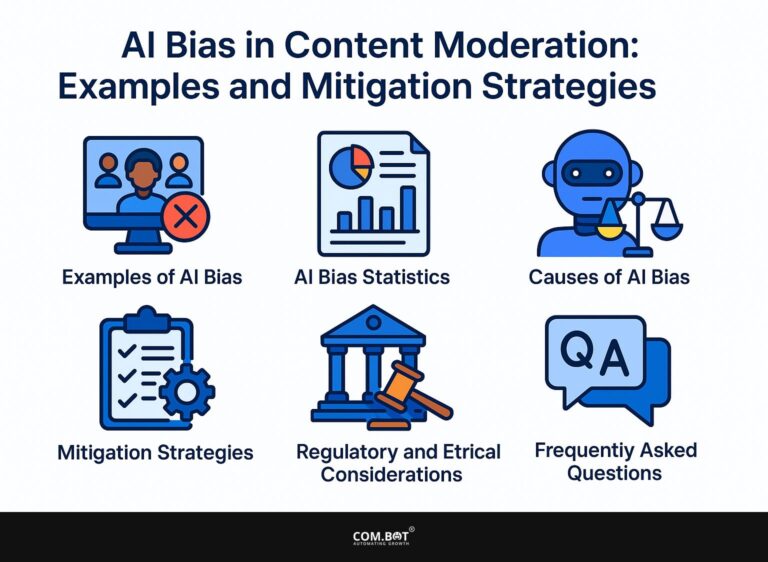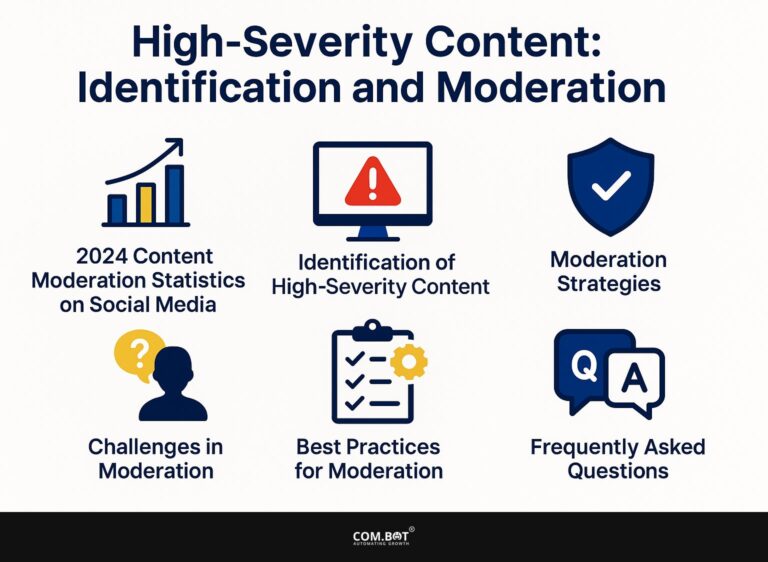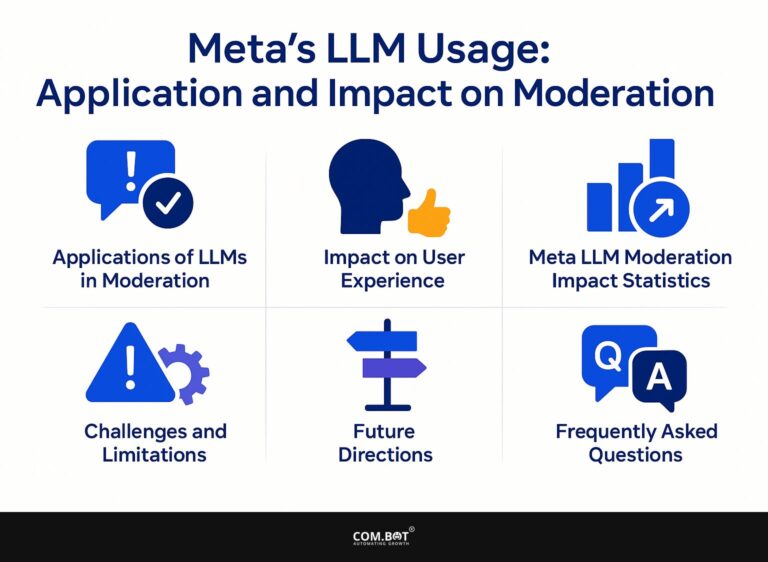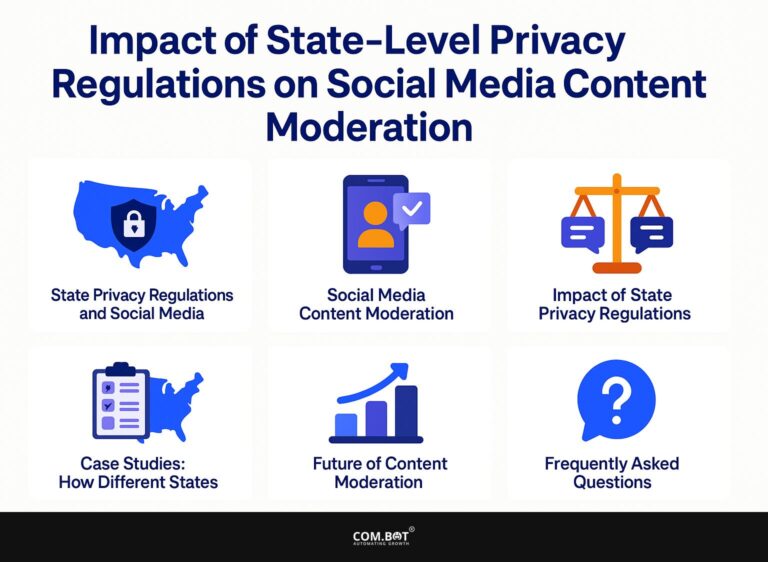Digital Privacy Laws: Key Provisions and Impact on Content Management
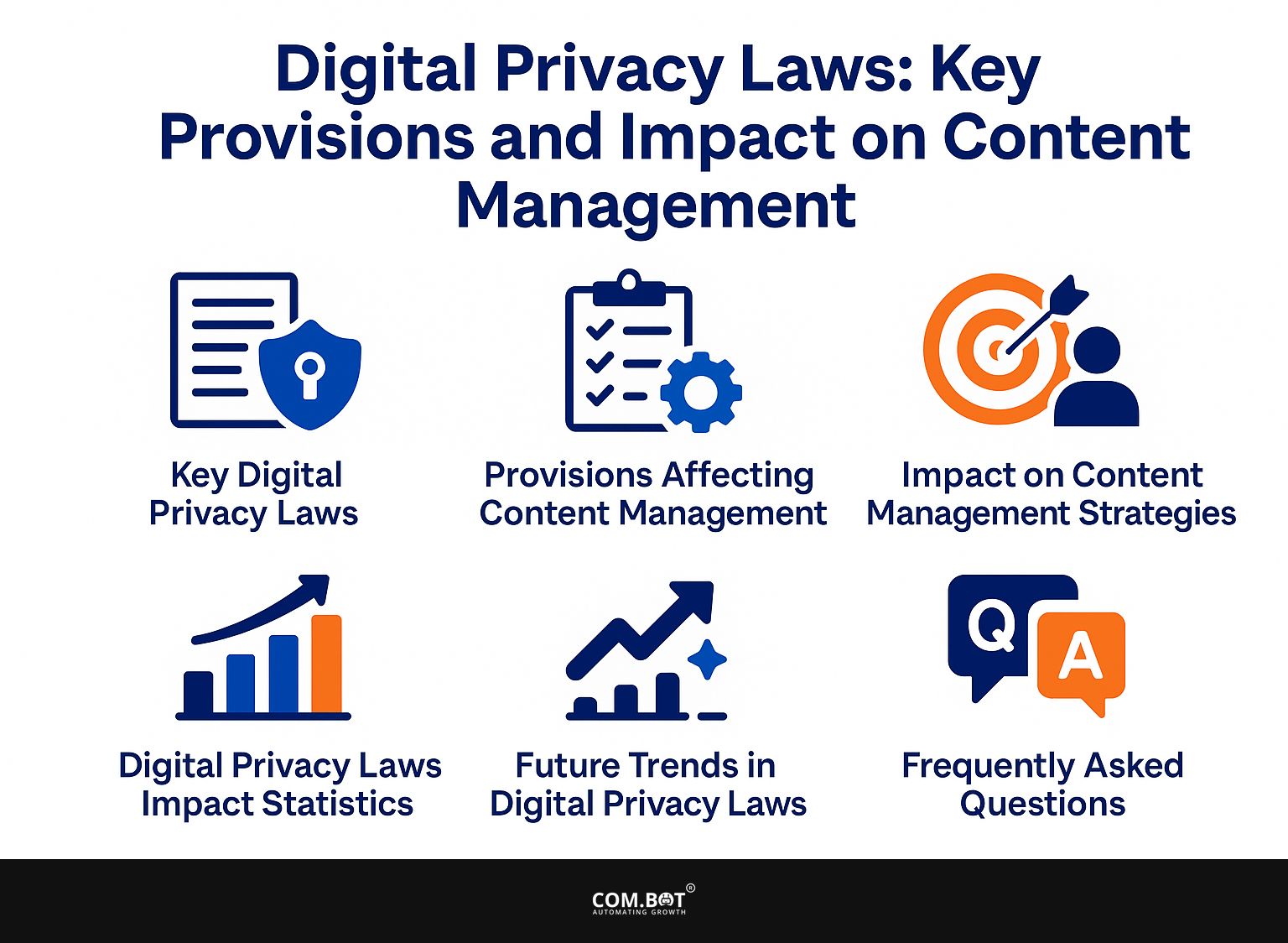
In a time where data protection is very important, knowing privacy laws is key for managing content well. Laws like the GDPR, California Privacy Rights Act, and Virginia Consumer Data Protection Act shape how businesses handle personal data, emphasizing consent and regulating data collection practices.
This article will look at important parts of these privacy laws and their major effect on content plans. It will help you follow the rules and use the best methods to protect user information.
Key Takeaways:
- Digital privacy laws such as GDPR, CCPA, and HIPAA have been established to protect individuals’ personal information and give them control over how their data is used.
- These laws have provisions that affect content management, including consent for data collection and user rights for accessing their data, which can impact content creation and distribution strategies.
- Businesses need to follow digital privacy laws to keep their audience’s trust and prepare for new rules and technology changes that could affect data privacy.
- 1 Key Digital Privacy Laws
- 2 Provisions Affecting Content Management
- 3 Impact on Content Management Strategies
- 4 Digital Privacy Laws Impact Statistics
- 4.1 **Digital Privacy: Consumer Views** Digital privacy is important. People’s feelings about online privacy shape their internet use. This section examines consumer opinions on privacy when using online services. We will talk about the key issues people have and how these thoughts affect their actions online.
- 4.2 Digital Privacy Information: Effect of Privacy Rules
- 4.3 Digital Privacy: Managing and Handling Data
- 4.4 1. Compliance Requirements
- 4.5 2. Content Creation and Distribution Challenges
- 5 Future Trends in Digital Privacy Laws
- 6 Frequently Asked Questions
- 6.1 1. What are digital privacy laws and why are they important?
- 6.2 2. What are the key provisions of digital privacy laws?
- 6.3 3. How do digital privacy laws impact content management?
- 6.4 4. What are the consequences of not complying with digital privacy laws?
- 6.5 5. How do digital privacy laws affect international companies?
- 6.6 6. How can companies follow digital privacy laws?
1. Definition and Importance
Digital privacy laws define the rules for collecting, processing, and storing personal data, thus ensuring user rights and data security. These laws, such as the General Data Protection Regulation (GDPR), emphasize individual control over personal information.
For example, the GDPR mandates that businesses must obtain explicit consent before processing data and allows individuals the right to access their personal records. This safeguards users and imposes large penalties on companies that do not follow rules, affecting how they function.
More consumers know about their rights, leading businesses to improve how they handle privacy. They use privacy management software to follow regulations.
2. Historical Context
The evolution of digital privacy laws began in the late 20th century, culminating in landmark regulations such as the GDPR in 2018. In 1995, the Data Protection Directive set guidelines for EU countries, focusing on personal rights and data privacy. This was followed by the 2002 ePrivacy Directive, focusing on online privacy and cookie usage.
In 2018, the GDPR took center stage, enhancing individuals’ control over personal data and imposing strict penalties for non-compliance. Meanwhile, in the U.S., the CCPA emerged in 2020, setting new standards for consumer privacy rights and transparency. These milestones illustrate an ongoing global trend towards stronger data protection and privacy legislation.
Key Digital Privacy Laws
Important laws like the GDPR and CCPA influence how data is protected and the rights users have today. For an extensive analysis of this trend, our comprehensive study on the impact of state-level privacy regulations on social media explores the broader implications.
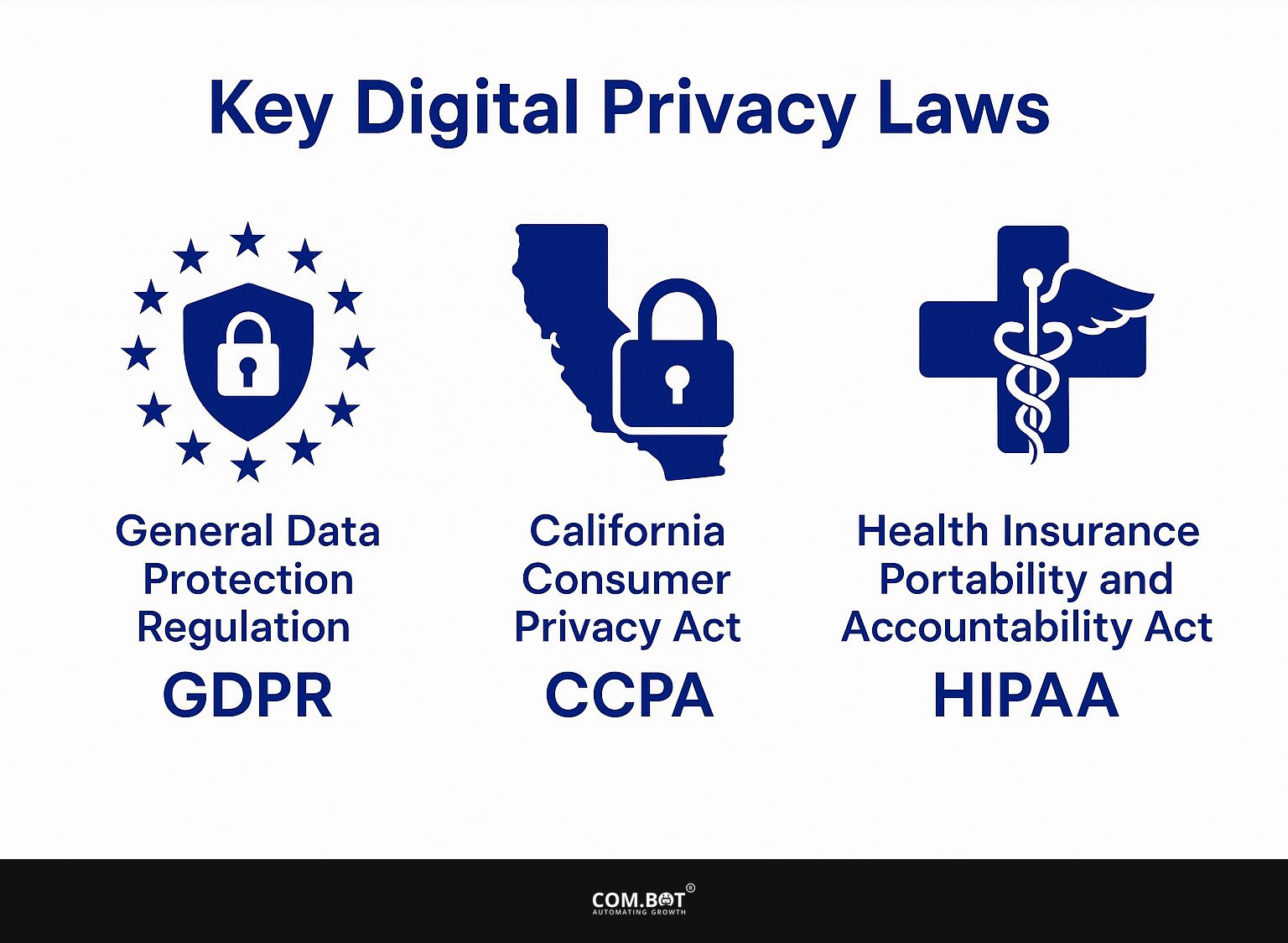
1. General Data Protection Regulation (GDPR)
The GDPR is a detailed rule that sets clear rules for handling data, getting permission, and being responsible throughout the EU. It grants specific rights to data subjects, including the right to access their data, the right to rectify inaccuracies, and the right to erasure under certain conditions.
Businesses must have a legal basis for processing personal data, such as consent or contractual necessity. Breaking the rules can lead to severe punishments, including fines up to EUR20 million or 4% of annual global revenue, whichever is higher.
For example, a small online retailer might implement a GDPR-compliant privacy policy by updating its consent forms to explicitly inform customers about data usage, ensuring they can opt-in rather than opt-out.
2. California Consumer Privacy Act (CCPA)
The CCPA gives people living in California more control over their personal information, such as choosing not to have their data sold. The law allows consumers to access their data, request deletion, and receive clear information about data collection practices.
For instance, a California-based e-commerce company revamped its privacy policy and implemented a user-friendly portal where customers can easily opt-out of data sales or request data access. This change followed the rules and built trust with consumers, showing respect for their rights.
The company used tools like OneTrust to handle user consent, making it easy to add privacy features to their operations.
3. Health Insurance Portability and Accountability Act (HIPAA)
HIPAA safeguards private patient health details, enforcing strict rules on healthcare data protection. To comply with HIPAA, healthcare providers must implement key data security protocols, including encryption, access controls, and regular audits.
For example, the Mayo Clinic created a detailed plan to protect data by using encryption to secure patient records and setting up two-factor authentication for staff access. They perform yearly checks to find possible weaknesses, keeping patient data safe.
Following these steps meets HIPAA rules and helps patients feel confident that their health information is safe with the organization.
Provisions Affecting Content Management
Digital privacy laws have rules that affect how content is handled, especially in terms of gathering data and user agreement. This is particularly evident in the context of state-level privacy regulations and their impact on social media content moderation, as discussed in our article, Impact of State-Level Privacy Regulations on Social Media Content Moderation.
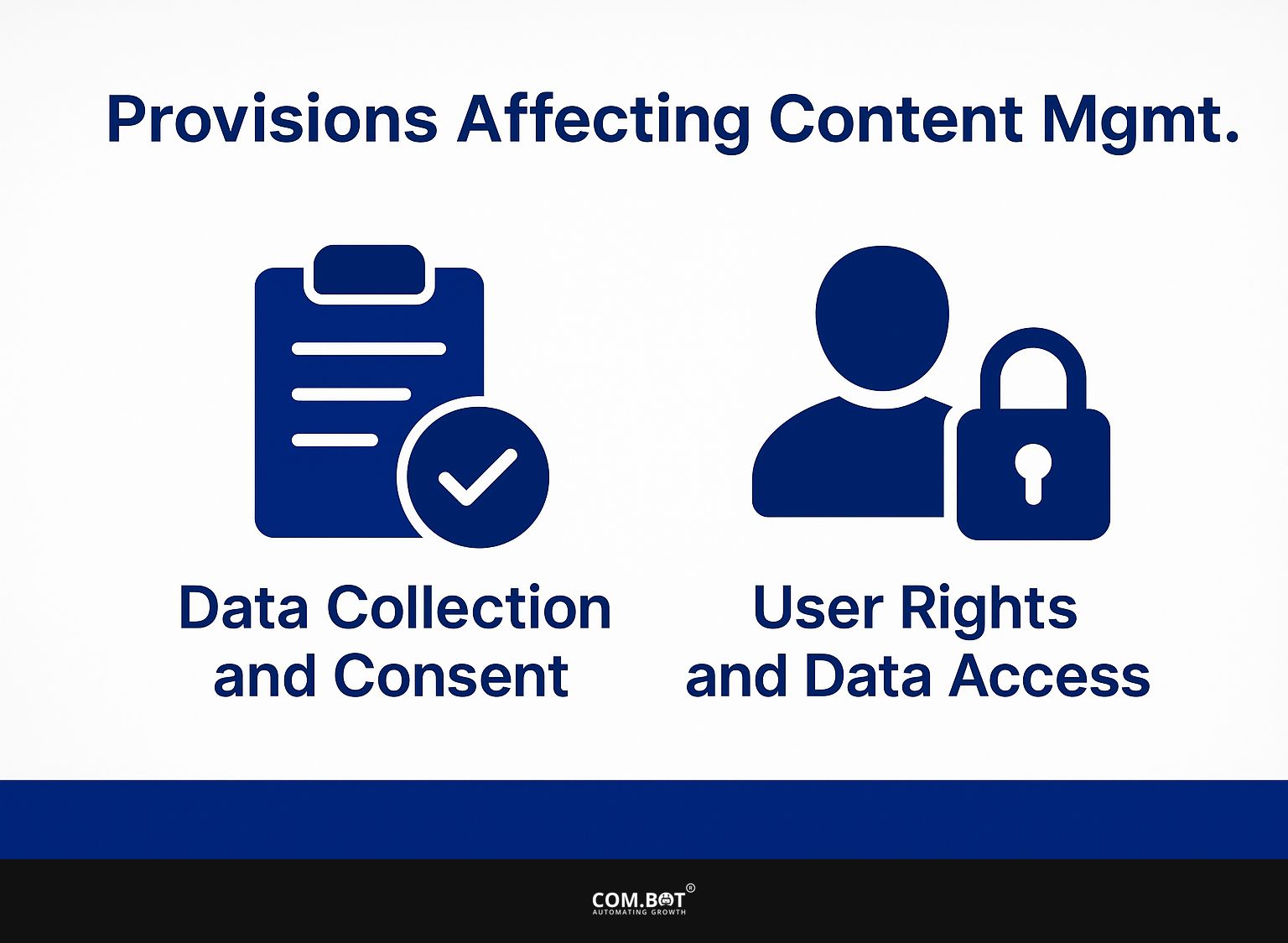
1. Data Collection and Consent
Data collection practices must adhere to strict consent requirements under GDPR, ensuring users are informed about their data usage. To comply, businesses should take the following steps:
- First, clearly communicate what data is collected and its purpose in a simple, accessible format.
- Second, provide an opt-in mechanism where users actively give consent before data collection begins.
- Third, maintain records of consent to demonstrate compliance.
Allow users easy access to change their consent preferences at any time. Using tools like OneTrust or TrustArc can make these processes smoother, helping your organization comply with legal requirements and respect user privacy.
2. User Rights and Data Access
Users have defined rights to access, rectify, and delete their personal data, significantly influencing content management practices.
To comply with GDPR and similar regulations, content managers should implement clear processes.
- Start by creating a user-friendly privacy policy that outlines data practices.
- Provide users with easy access to their personal data through an online portal, where they can review and request modifications.
- Use tools like OneTrust or TrustArc for privacy management and user consent tracking.
- Create a simple process for users to request deletions easily.
- Teaching your team these procedures makes respecting user rights a basic element of your content management plan.
Impact on Content Management Strategies
Privacy laws for digital content require businesses to change how they manage information. This helps them follow the rules and keep users’ trust. For those interested in deeper insights, our article on the impact of state-level privacy regulations on social media platforms explores how these laws are reshaping digital interactions on a broader scale.
Digital Privacy Laws Impact Statistics
Digital Privacy Laws Impact Statistics
**Digital Privacy: Consumer Views** Digital privacy is important. People’s feelings about online privacy shape their internet use. This section examines consumer opinions on privacy when using online services. We will talk about the key issues people have and how these thoughts affect their actions online.
Digital Privacy Information: Effect of Privacy Rules
Digital Privacy: Managing and Handling Data
The Digital Privacy Laws Impact Statistics Data provides important information on how digital privacy laws influence what consumers think, affect regulations, and alter how data is handled. This information is important for grasping the changes in digital privacy and what they mean for businesses and consumers.
Consumer Perception illustrates growing concerns about data privacy. A substantial 94% of organizations worry about losing customers due to privacy issues, reflecting the importance of trust in business-customer relationships. Similarly, 86% of US adults express concerns about data privacy, indicating a high level of awareness and anxiety about personal information security. However, only 20% of individuals feel confident in companies’ compliance with privacy laws, suggesting a gap between consumer expectations and organizational practices.
- Privacy Regulation Impact: The data reveals that 75% of the global population is covered by privacy laws, highlighting the widespread adoption of data protection regulations. These laws are beneficial, with 80% of organizations reporting positive impacts This includes better customer confidence and more efficient data processes. Large organizations are aligning their budgets accordingly, with a projected $2.5 million dedicated to privacy compliance.
Data Handling and Management metrics show the operational impacts of privacy laws. The cost for processing a single data subject request is $1,524, indicating significant resource allocation for compliance. Meanwhile, 96% of businesses prioritize data privacy, underscoring its importance in corporate strategy. The 72% increase in data subject requests from 2021 to 2022 reflects heightened consumer engagement with their data rights, driven by increased awareness and regulatory support.
Overall, the Digital Privacy Laws Impact Statistics Data shows that digital privacy is very important in our connected world. Organizations need to handle these challenges by improving compliance, focusing on building consumer trust, and effectively managing data requests to make the most of the opportunities these privacy laws offer.
1. Compliance Requirements
Following rules such as GDPR and CCPA requires careful handling of data, which affects how content is made and shared. Businesses need to apply strict rules, such as detailed records of how data is handled and setting up strong agreements with vendors about data handling.
Staff should be trained on their compliance responsibilities, so they understand the necessity of safeguarding personal data. Regular checks for compliance can point out potential risks.
Use tools like OneTrust for managing compliance, which provides templates and tracking features. Schedule audits every six months to check if policies are being followed and quickly address any problems, making it a regular practice for your organization to stick to these rules.
2. Content Creation and Distribution Challenges
Challenges in content creation and distribution arise from the need to balance user privacy with effective marketing strategies. To comply with privacy laws, use clear methods for user consent, such as checkboxes during sign-up and simple privacy policies.
Tools like OneTrust and TrustArc can help with managing consent automatically. Make sure your data handling practices are clear; for example, use sign-up forms to explain how you will use subscribers’ information.
Regularly audit your data storage practices to identify potential risks related to data breaches. By building trust with clear information and following rules, you can increase user involvement and safeguard your brand’s name.
Future Trends in Digital Privacy Laws
As digital privacy rules change, new laws and technology developments will change how data is protected. These changes particularly impact social media platforms, as highlighted by the state-level privacy regulations affecting content moderation.
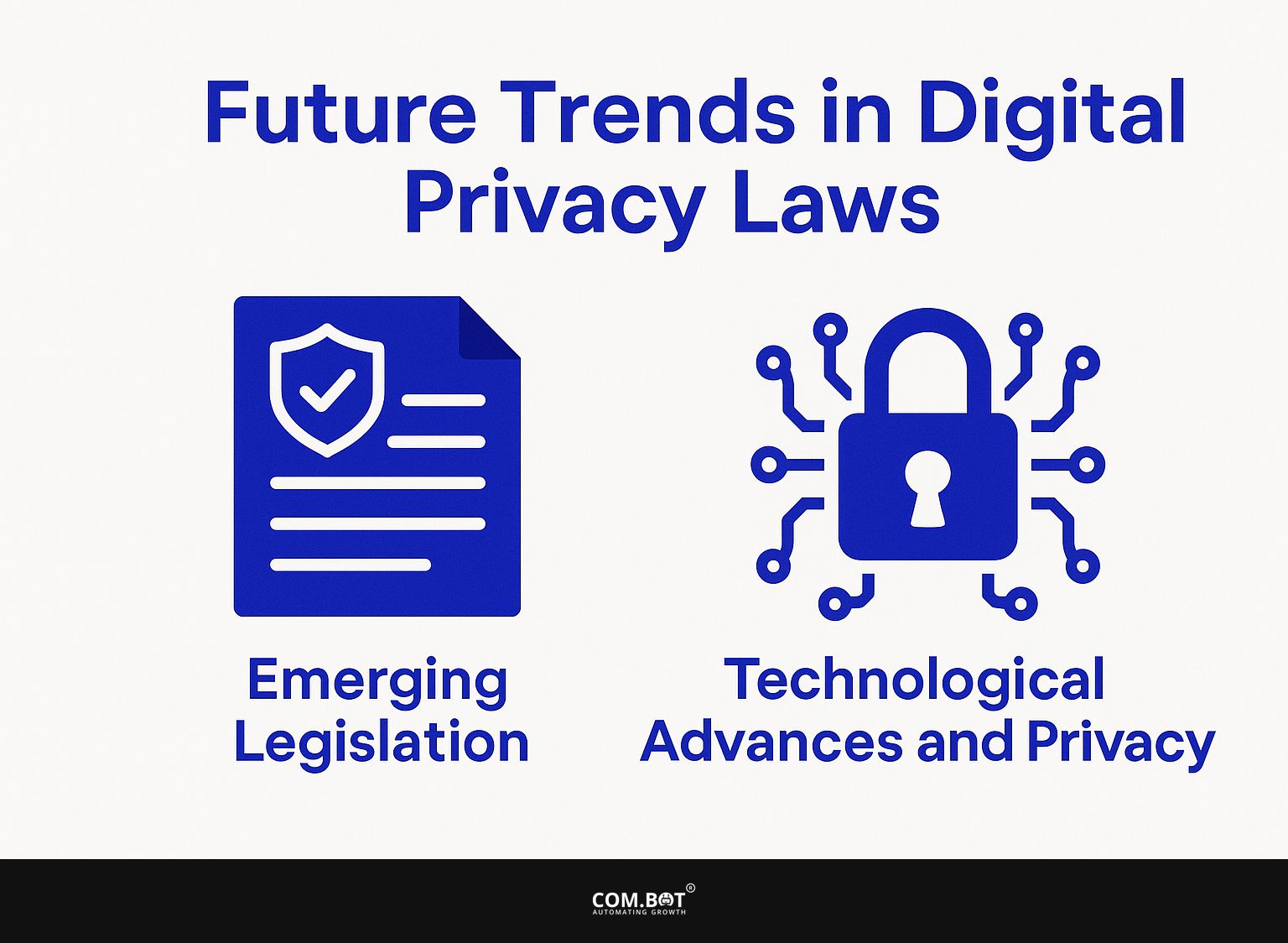
1. Emerging Legislation
New laws are emerging globally, including state-specific regulations like the Virginia Consumer Data Protection Act and the Colorado Privacy Act. These laws require businesses to put strong data protection measures in place.
For example, companies need to evaluate how data use affects people and make their data collection methods open and clear. To prepare, organizations should review their data handling policies, train employees on compliance measures, and invest in privacy management tools like OneTrust or TrustArc.
Establishing clear data access protocols can help mitigate risks associated with these regulations. Businesses can earn consumer trust and prevent hefty penalties by complying with these new laws promptly.
2. Technological Advances and Privacy
New technologies like digital IDs and AI-based analytics are changing how we handle privacy, but they also introduce new challenges.
Businesses must prioritize accountability measures to protect user data amidst these changes. Using strong data encryption, doing regular security checks, and teaching users about privacy settings are important actions.
For example, businesses can use tools like OneLogin for secure identity management or employ Data Loss Prevention (DLP) software to stop unauthorized access to data.
Regularly updating privacy policies to show new technologies and being open with users about data use can increase trust and meet changing rules.
Frequently Asked Questions
1. What are digital privacy laws and why are they important?
Digital privacy laws are regulations that protect the privacy and personal information of individuals online. They are important because they help prevent data breaches and unauthorized access to sensitive data.
2. What are the key provisions of digital privacy laws?
The key provisions of digital privacy laws typically include regulations on data collection, storage, and sharing, as well as requirements for obtaining informed consent from individuals before collecting their personal information.
3. How do digital privacy laws impact content management?
Digital privacy laws have a significant impact on content management, as they require companies to handle and protect personal information in a specific way. This may include implementing security measures and obtaining consent before collecting and using personal data.
4. What are the consequences of not complying with digital privacy laws?
Not complying with digital privacy laws can result in hefty fines, legal action, and damage to a company’s reputation. It can also lead to loss of trust from customers and potential legal repercussions.
5. How do digital privacy laws affect international companies?
Digital privacy laws can have a global impact, as they often apply to any company that collects personal information from individuals residing in a specific region. This means that international companies must comply with the laws of the countries where their customers are located.
6. How can companies follow digital privacy laws?
To comply with digital privacy laws, companies need to frequently check and refresh their privacy policies and procedures, put in place data protection and security measures, and get permission from people before gathering their personal information. They should keep up with any changes or updates in the laws to stay compliant.
